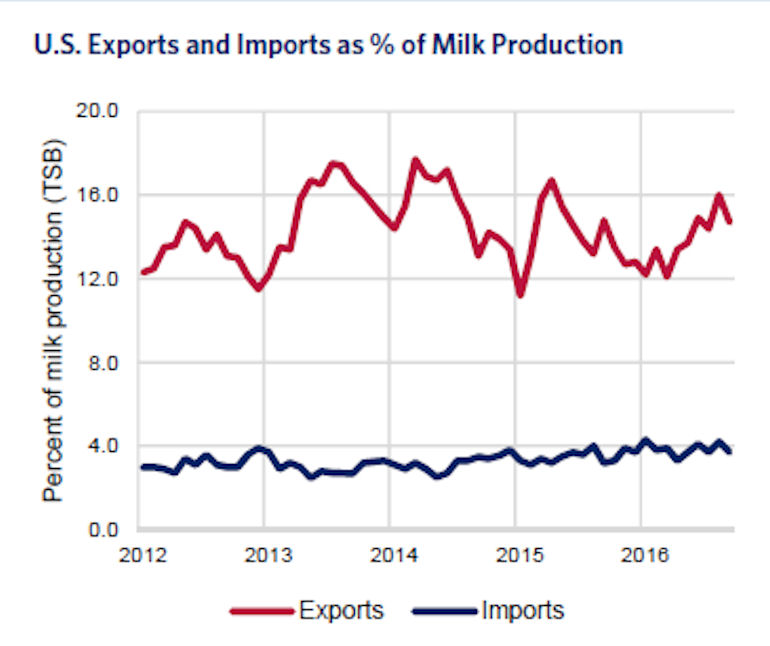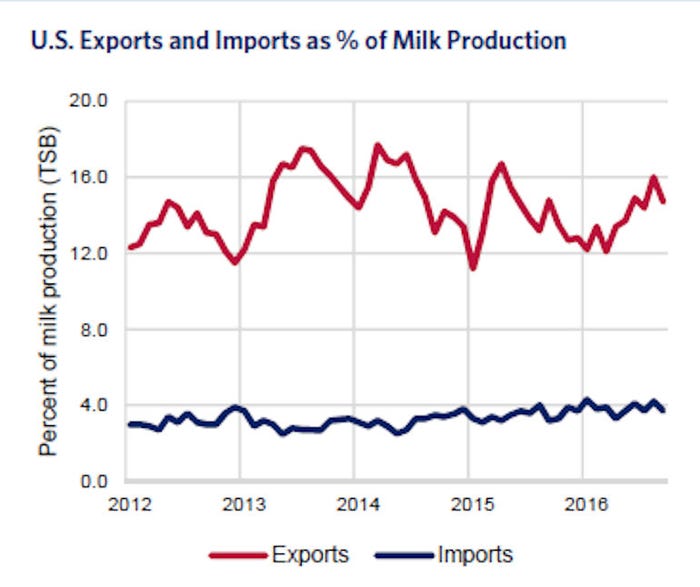NMPF and USDEC seek further dialogue on ways they can work with incoming Trump Administration on trade policy.

The National Milk Producers Federation (NMPF) and the U.S. Dairy Export Council (USDEC) sent a joint letter Tuesday to President-elect Donald Trump outlining the importance of exports to the U.S. dairy sector and seeking further dialogue on ways the organizations can work with the incoming administration on trade policy.

Source: USDEC
In their letter, NMPF and USDEC pointed out that expanded agricultural trade has created thousands of jobs and billions of dollars in economic activity in rural America. Therefore, it is important “to preserve current overseas dairy sales while seeking to achieve new gains by removing foreign barriers that hold back additional exports,” according to NMPF president and chief executive officer Jim Mulhern.
In a column, Mulhern wrote that the “Trump transition process will produce some surprises as we move toward January, but it’s already clear that the Trump Administration will usher in a new approach in Washington (D.C.) to some of the issues of interest to dairy farmers. In every respect, this is an opportunity for dairy farmers both to seek new paths to achieve our goals and also to accelerate ongoing efforts to make needed changes.
“While momentum behind the Trans-Pacific Partnership and the Transatlantic Trade & Investment Partnership has stalled for the time being, the need for U.S. dairy access to foreign markets has not,” Mulhern said in his "Corner Column."
The U.S. Department of Agriculture estimates that, at the dairy farm level, every $1 billion of U.S. dairy exports generate more than 20,000 jobs and almost $3 billion of economic output. At the manufacturing level, USDA calculates that U.S. dairy exports support approximately 3,200 jobs per $1 billion of exports. Exports consume approximately 14% of the milk produced on American farms — the equivalent of one day’s production each week.
The letter detailed how losing the equivalent of one day a week’s worth of milk production would have dire impacts on American farmers and manufacturing jobs at U.S. food companies.
“In 2015, exports were equivalent to 14% of U.S. milk production on a total milk solids basis. That equates to all of the milk produced on American farms one day of each week. Twenty years ago, that percentage was essentially zero,” the letter stated. "For an industry where prices rise or plummet based on shifts in supply and demand of just a few percentage points, this export growth has created a net-positive dairy trade balance. An NMPF economic analysis last year calculated that U.S. (free trade agreements') dairy provisions have played a key role in that growth, generating an additional $8.3 billion for the industry between 2004 and 2014."
USDEC president Tom Suber added, “During the last two decades, dairy exports have grown from less than $1 billion a year to over $5 billion last year, in the process generating more than 120,000 jobs in dairy farming, manufacturing and related sectors.”
Despite achievements made by free trade agreements, “rampant foreign non-tariff barriers require a ramp-up in trade enforcement,” Suber said, urging the Trump Administration to closely monitor other nations’ compliance with existing market access concessions.
The letter said these non-tariff barriers are a “real threat” and identified examples such as Canada’s protectionist dairy policies, the European Union’s abuse of geographical indications and India’s long-standing blockage of U.S. dairy shipments.
While emphasizing the need to ensure a level international playing field, Mulhern said competitors to the U.S. dairy sector in Europe and Oceania “have not been happy to see the U.S. seizing market share from them in the last 15 years. They would relish the opportunity to regain an advantage over U.S. suppliers.”
The dairy groups noted that U.S. regulatory agencies need to support exports, which will unleash greater U.S. dairy exports. “While our competitors have government officials specifically dedicated to resolving technical regulatory issues in a manner that helps their industries supply foreign markets, in the U.S., regulatory agencies too often tend to do the opposite,” the letter said. “We need to ensure that our regulatory agencies are tasked with having a direct hand in honoring simple requests related to our exports. Where the requests are more challenging, government agencies should find creative solutions to provide the assurances needed to keep trade flowing.”
About the Author(s)
You May Also Like





